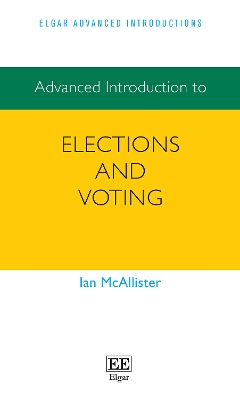Elgar Advanced Introductions
1 total work
Elgar Advanced Introductions are stimulating and thoughtful introductions to major fields in the social sciences, business and law, expertly written by the world’s leading scholars. Designed to be accessible yet rigorous, they offer concise and lucid surveys of the substantive and policy issues associated with discrete subject areas.
Tackling the complex issues surrounding what shapes a person’s vote, this cutting-edge Advanced Introduction analyses the main findings in current research on electoral behavior to provide a comprehensive understanding of electoral choice.
Key Features:
- Treats the voting decision as the cumulation of a lifetime of learning
- Studies global voting examples, from Europe and the Anglo-American democracies to newly democratic states
- Places the act of voting in context to cover all dimensions of the voting decision, examining the causes of an individual's vote and how that interacts with the design of the country's institutions
- Considers the ideological effects of short-term factors like issues and leaders which dominate election campaigns, and long-term factors like social backgrounds, looking at how class and economic interests can influence voters
Analysing the incentives behind party loyalties and political participation, this Advanced Introduction will be an invaluable guide for students and scholars interested in political and electoral behavior and comparative politics.
